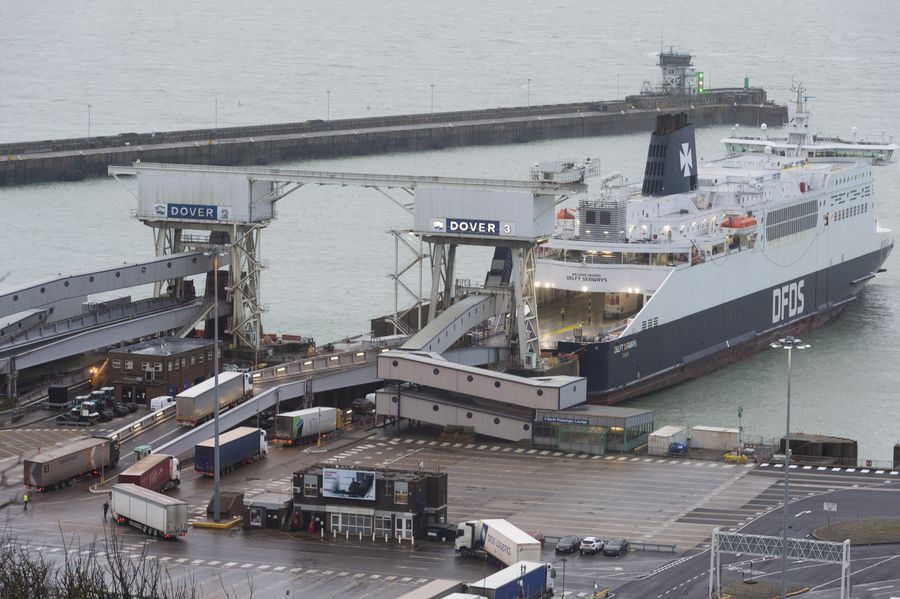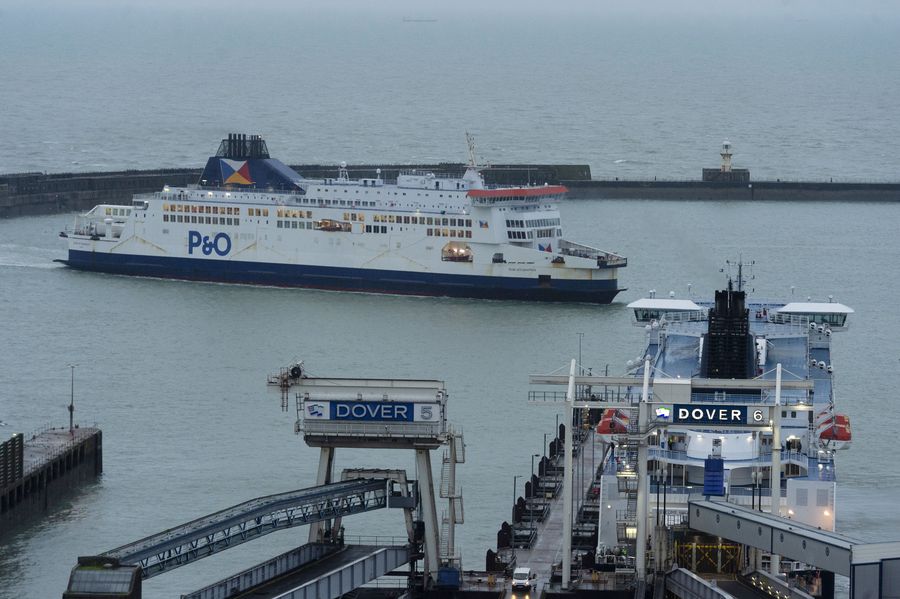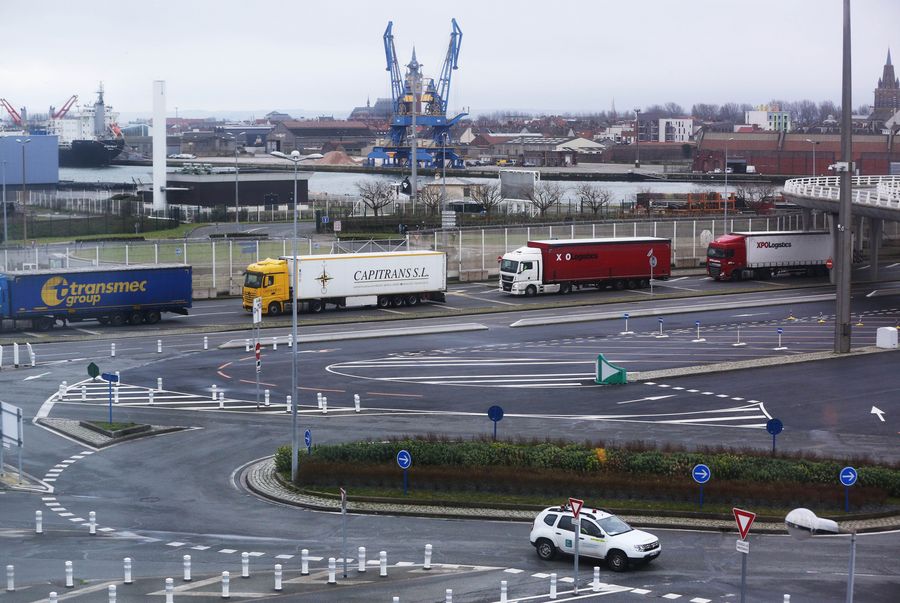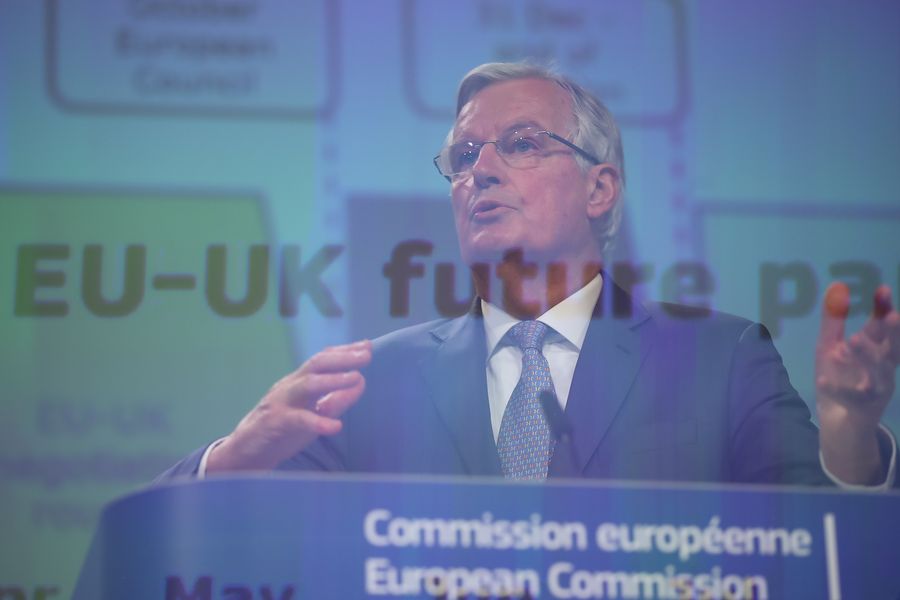
Cars and trucks embark on a ferry in Port of Dover on the first day after Brexit in Dover, Britain, Feb. 1, 2020. (Photo by Ray Tang/Xinhua)
The new tariff regime, known as the UK Global Tariff, will come into effect on Jan. 1, 2021 for imports from any country that Britain does not have a free trade agreement with.
It is the latest effort by the British government to shape its post-Brexit trade policy.
LONDON, Feb. 7 (Xinhua) -- The British government has started developing the country's new tariff regime for imports after the Brexit transition period, which ends in December this year.
It is the latest effort by the British government to shape its post-Brexit trade policy. Earlier this week, Prime Minister Boris Johnson said Britain will seek a Canada-style trade agreement with the European Union (EU) as part of its future trade relationship with the bloc, and diverge from EU rules.
The new tariff regime, known as the UK Global Tariff, will come into effect on Jan. 1, 2021 for imports from any country that Britain does not have a free trade agreement with. The Department for International Trade on Thursday launched a four-week public consultation, seeking views on simplifying and tailoring the tariff to suit British businesses and households, such as removing tariffs of less than 2.5 percent and rounding tariffs down to the nearest 2.5 percent, 5 percent or 10 percent band.

A ferry arrives at the Port of Dovert on the first day after Brexit in Dover, Britain, Feb. 1, 2020.(Photo by Ray Tang/Xinhua)
Other contents for consultation include removing tariffs on key inputs to production which could reduce costs for British manufacturers, and removing tariffs where the Britain has zero or limited domestic production which could help to lower prices for consumers.
International Trade Secretary Liz Truss said: "The UK has left the EU and it is time for us to look forward to our future as an independent, global champion of free trade...It is vitally important that we now move away from complex tariff schedule imposed on us by the European Union."

Trucks wait to embark a ferry to Britain at the Calais Port in France on Jan. 31, 2020. (Xinhua/Gao Jing)
In Johnson's vision for Britain's post-Brexit trade relations, the country will be unshackled after 47 years tied to the EU.
"We have so often been told that we must choose between full access to the EU market, along with accepting its rules and courts on the Norway model, or a free trade agreement, which opens up markets and avoids the full panoply of EU regulation, like the Canada deal," Johnson said earlier this week in a speech to business leaders in London.
"We want a comprehensive free trade agreement, similar to Canada's. But in the very unlikely event that we do not succeed, then our trade will have to be based on our existing Withdrawal Agreement with the EU," he said.
The prime minister said the choice for Britain is emphatically not a case of "deal or no deal", the question is whether Britain agrees a trading relationship with the EU comparable to Canada's -- or more like Australia's.
"And I have no doubt that in either case the UK will prosper," he said.
Canada and the EU signed in 2016 the Comprehensive Economic and Trade Agreement after seven years of negotiation. It is regarded as the most ambitious trade agreement that the EU has ever concluded with non-EU countries. Under it, import tariffs on most goods have been eliminated, though customs and VAT checks still remain. The flow of services, such as banking between the two sides are much more restricted.
Australia and the EU launched negotiations for a free trade agreement in June 2018, aiming at removing barriers to trade in goods and services while creating opportunities for small and large companies.
"There is no need for a free trade agreement to involve accepting EU rules on competition policy, subsidies, social protection, the environment, or anything similar any more than the EU should be obliged to accept UK rules," Johnson said.
Britain and the EU are expected to start trade talks in March. Britain will continue to follow all EU rules and regulations during a transition period after Brexit, due to end on Dec. 31.

The multiple exposure photo shows Michel Barnier, EU chief Brexit negotiator, speaking during a press conference in Brussels, Belgium, Feb. 3, 2020.(Xinhua/Zhang Cheng)
Michel Barnier, the EU's chief Brexit negotiator, said earlier this week that the bloc was ready to offer a "highly ambitious trade deal as the central pillar of this partnership", but Britain needs to agree to "specific and effective guarantees to ensure a level playing field" to ensure competition "is and remains open and fair."■



